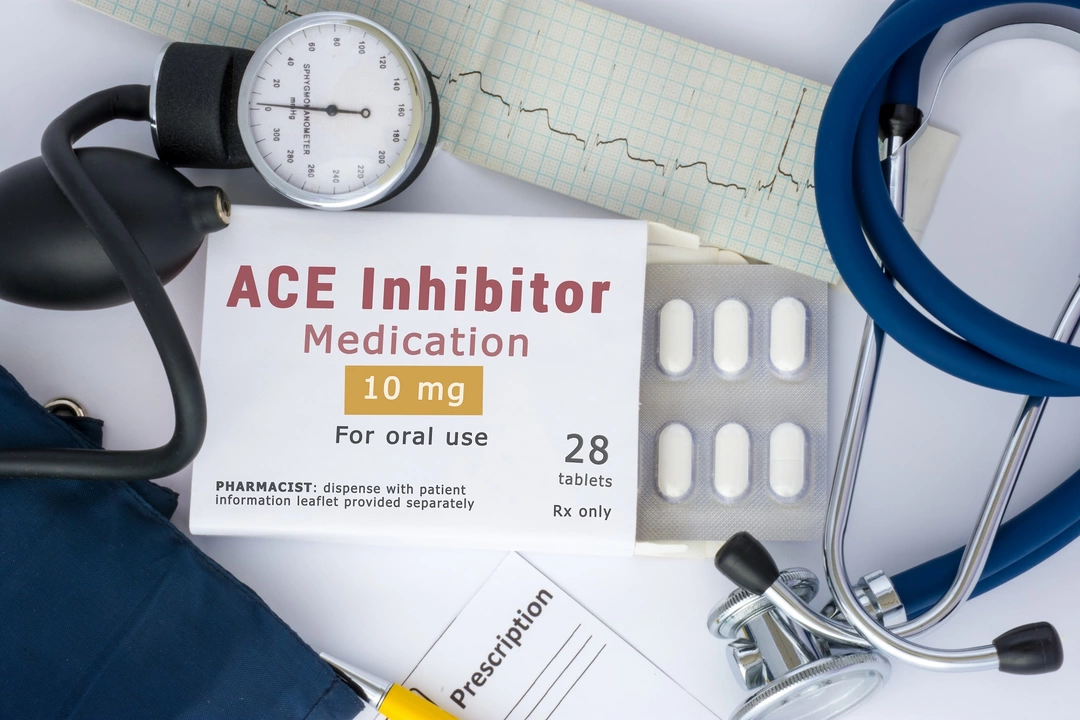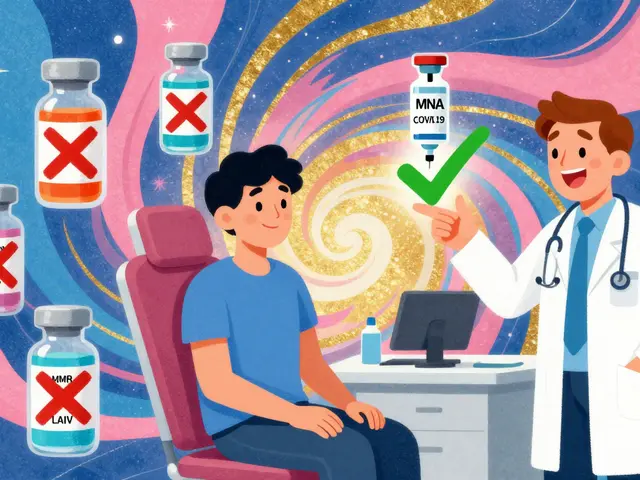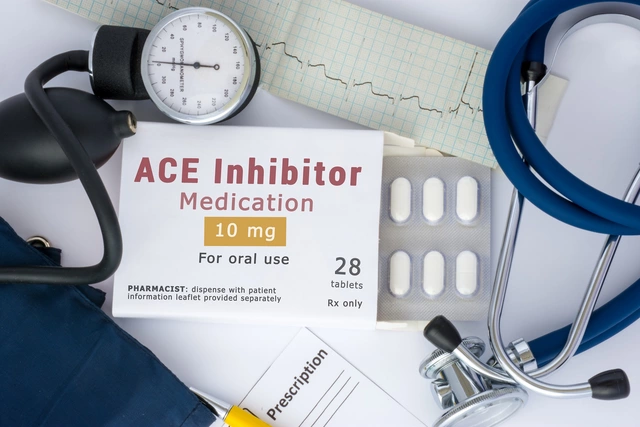Understanding Labetalol: A Dual-Action Medication for Hypertension
Labetalol is a unique medication that has been proven to be effective in treating high blood pressure, or hypertension. Unlike other antihypertensive medications, labetalol combines two different mechanisms of action, which makes it more potent and versatile. In this section, we'll discuss what makes labetalol stand out among other hypertension medications and how it can benefit those struggling with high blood pressure.
The first mechanism of action of labetalol is its ability to block the alpha-1 receptors. These receptors are found on the walls of blood vessels and are responsible for constricting the blood vessels when they are stimulated. By blocking these receptors, labetalol helps to relax and widen the blood vessels, allowing blood to flow more freely and reducing blood pressure.
The second mechanism of action of labetalol is its ability to block the beta receptors, specifically beta-1 and beta-2 receptors. Beta-1 receptors are mainly found in the heart, and their stimulation increases heart rate and contractility. By blocking these receptors, labetalol reduces the workload of the heart and lowers blood pressure. On the other hand, beta-2 receptors are mainly found in the blood vessels of skeletal muscles and the bronchial tree. Blocking these receptors can cause some constriction of blood vessels, but the overall effect of labetalol is still a reduction in blood pressure due to its combined alpha and beta-blocking properties.
Benefits of Labetalol for Different Types of Hypertension
Because of its dual-action mechanism, labetalol is particularly effective in treating various types of hypertension. In this section, we'll explore the different scenarios in which labetalol might be the preferred choice of medication for managing high blood pressure.
Firstly, labetalol is especially beneficial for people with essential hypertension. Essential hypertension is the most common type of high blood pressure, affecting around 90-95% of individuals with hypertension. The exact cause of essential hypertension is unknown, but it is thought to be a combination of genetic, environmental, and lifestyle factors. Labetalol's ability to block both alpha and beta receptors makes it a powerful tool in treating this type of hypertension.
Secondly, labetalol is also advantageous in treating secondary hypertension, which is high blood pressure caused by an underlying medical condition, such as kidney disease or hormonal imbalances. In some cases, treating the underlying condition may resolve the hypertension, but in others, medications like labetalol may be necessary to manage blood pressure effectively.
Lastly, labetalol is often used in the treatment of hypertensive emergencies and urgencies. A hypertensive emergency is a life-threatening situation in which blood pressure is extremely high, and there is evidence of damage to organs such as the brain, heart, or kidneys. In these cases, labetalol can be administered intravenously to rapidly lower blood pressure and reduce the risk of organ damage or death.
Labetalol: A Safer Option for Pregnant Women with Hypertension
Hypertension during pregnancy can pose significant risks to both the mother and the unborn baby. However, finding a safe and effective medication to manage high blood pressure during pregnancy can be challenging. In this section, we'll discuss why labetalol is often the preferred choice for treating hypertension in pregnant women.
Labetalol is a category C medication, which means that there is limited evidence on its safety during pregnancy. However, many studies and clinical experience have shown that labetalol is generally well-tolerated by pregnant women and does not cause harm to the fetus. It is also worth noting that other antihypertensive medications, such as ACE inhibitors and angiotensin receptor blockers (ARBs), are contraindicated during pregnancy due to their potential to cause harm to the fetus.
Moreover, labetalol has been shown to be effective in treating hypertension in pregnant women, and its dual-action mechanism makes it particularly suitable for managing blood pressure during pregnancy. Overall, labetalol is considered a safer option for pregnant women with hypertension compared to other antihypertensive medications.
Managing Side Effects and Interactions of Labetalol
While labetalol is generally well-tolerated by most patients, it can cause some side effects and may interact with other medications. In this section, we'll discuss some common side effects of labetalol and how to manage them, as well as potential drug interactions to be aware of.
Some common side effects of labetalol include dizziness, fatigue, headache, and nausea. These side effects are generally mild and can be managed by adjusting the dose of the medication, taking it with food, or giving the body some time to adjust to the medication. More serious side effects, such as shortness of breath, swelling, or an irregular heartbeat, should be reported to a healthcare provider immediately.
As for drug interactions, labetalol may interact with medications such as other blood pressure medications, antidepressants, and heart medications. It is essential to discuss all medications and supplements you are taking with your healthcare provider to avoid potential interactions and ensure the safe and effective use of labetalol.
Taking Charge of Your Hypertension with Labetalol
Managing hypertension is a lifelong commitment, and finding the right medication is a crucial step in achieving and maintaining a healthy blood pressure. Labetalol's dual-action mechanism and proven effectiveness make it a valuable option for many individuals struggling with hypertension.
Remember that medication is only one part of a comprehensive hypertension management plan. It is essential to work closely with your healthcare provider to monitor and adjust your treatment plan as needed, and to incorporate lifestyle modifications such as a healthy diet, regular exercise, and stress management to improve your overall cardiovascular health.
With the right treatment plan and a commitment to managing your hypertension, you can take charge of your health and reduce the risk of complications associated with high blood pressure.








May 20, 2023 AT 13:53
thilagavathi raj
Labetalol's alpha-beta blockade is a game-changer for refractory HTN. The dual mechanism offers hemodynamic stability that monotherapies can't match. Beta-1 suppression reduces cardiac output, while alpha-1 antagonism drops peripheral resistance-synergistic AF.
May 21, 2023 AT 04:18
Sandridge Neal
Thank you for this exceptionally well-structured overview. As a clinical pharmacist with over two decades of experience managing hypertensive patients, I can attest to labetalol’s consistent efficacy and predictable pharmacokinetics. Its intravenous formulation remains indispensable in obstetric emergencies and acute aortic dissections. Rigorous adherence to dosing protocols minimizes adverse events while maximizing therapeutic benefit.
May 22, 2023 AT 07:18
Diane Thompson
Okay but why not just use amlodipine? It’s cheaper, once daily, and doesn’t make you feel like a zombie. Labetalol’s just overhyped because it’s been around since the 80s. Also, ‘category C’? That’s just fancy speak for ‘we’re not sure if it kills babies.’
May 23, 2023 AT 19:35
Helen Moravszky
I love how this explains the dual action so clearly! I’ve been on labetalol for gestational HTN and honestly, I was terrified at first-but my OB swears by it, and my BP’s been stable for months now. Side effects were mild (a little tired, but that’s normal with any med, right?). Also, thank you for mentioning lifestyle changes-yoga and cutting salt helped me so much! 💪❤️
May 25, 2023 AT 06:06
Reginald Matthews
Interesting breakdown. I’m curious-how does labetalol’s beta-2 blockade affect bronchial tone in patients with mild asthma? I’ve seen conflicting reports in the literature. Is the net effect still neutral due to alpha-1 dominance, or should caution still be exercised?
May 26, 2023 AT 15:14
Debra Callaghan
Stop pushing this outdated drug. If you’re prescribing labetalol for pregnancy, you’re not keeping up with guidelines. Nifedipine and methyldopa are safer, cheaper, and better studied. Labetalol’s just a legacy drug being kept alive by inertia-and lazy doctors who don’t want to look up new protocols.